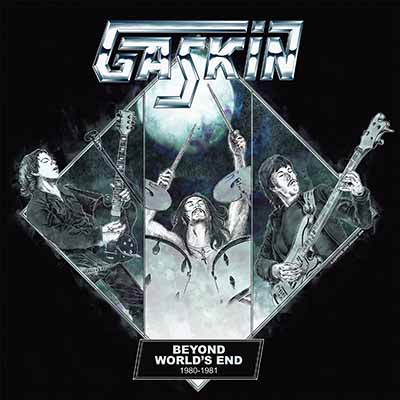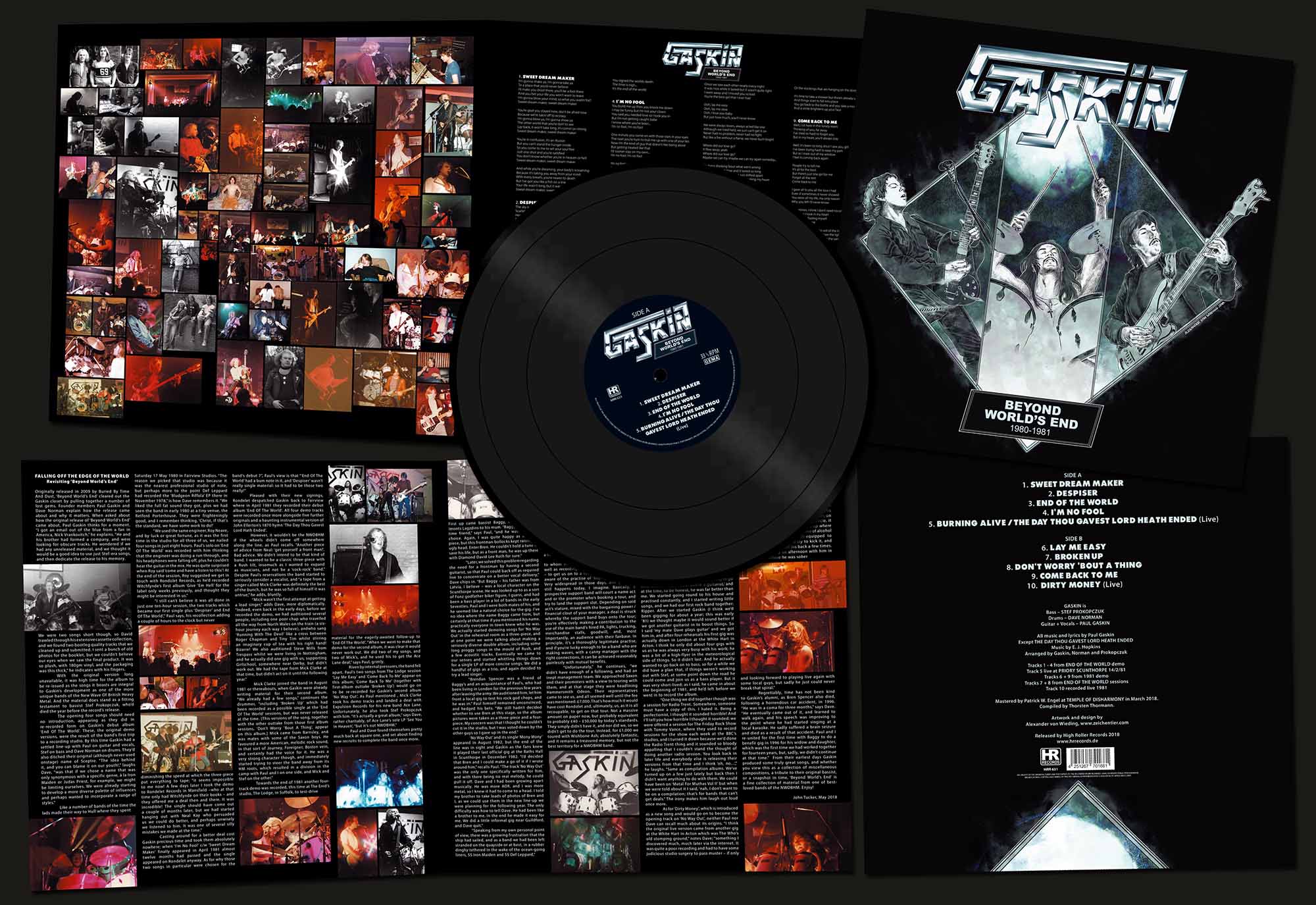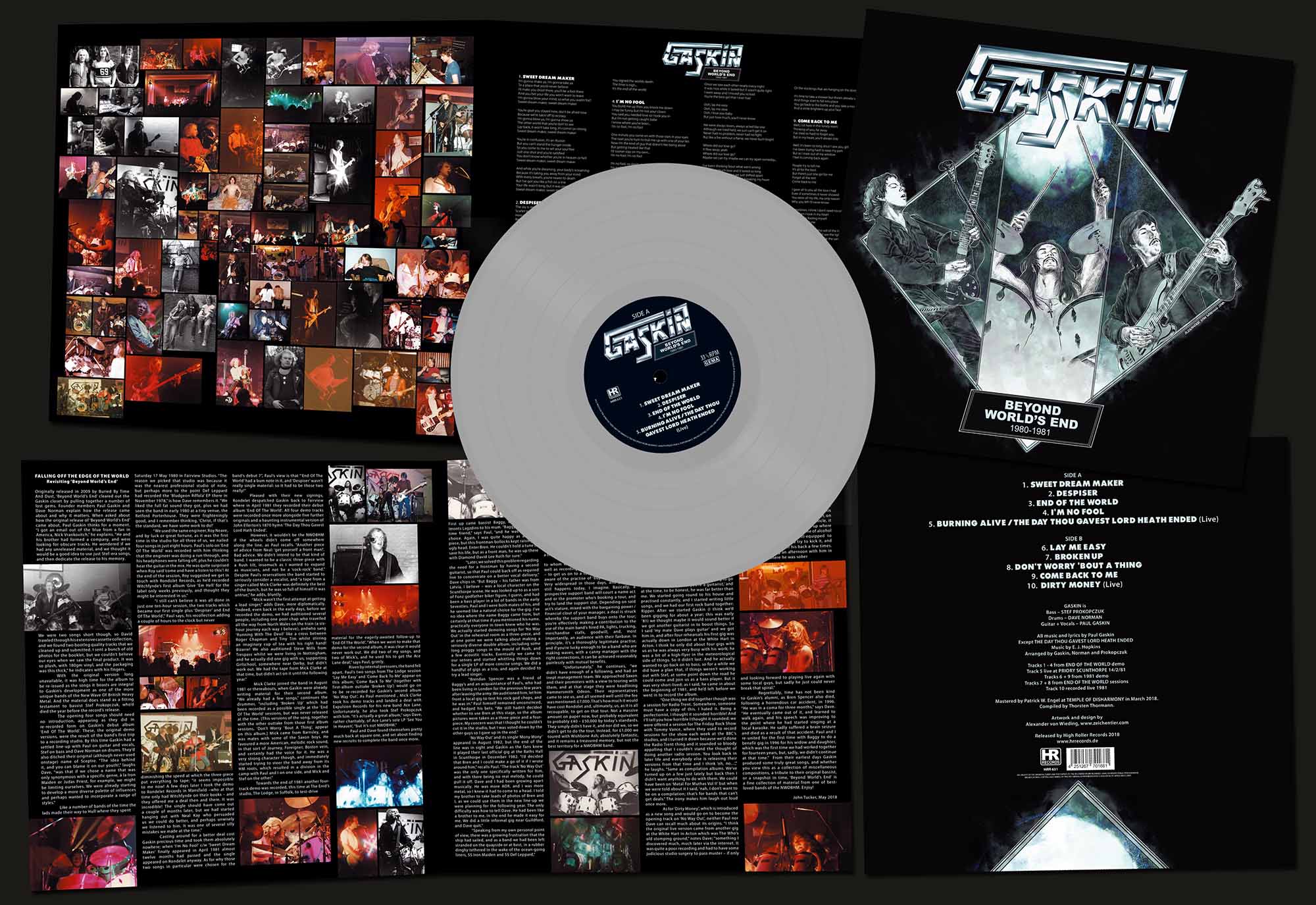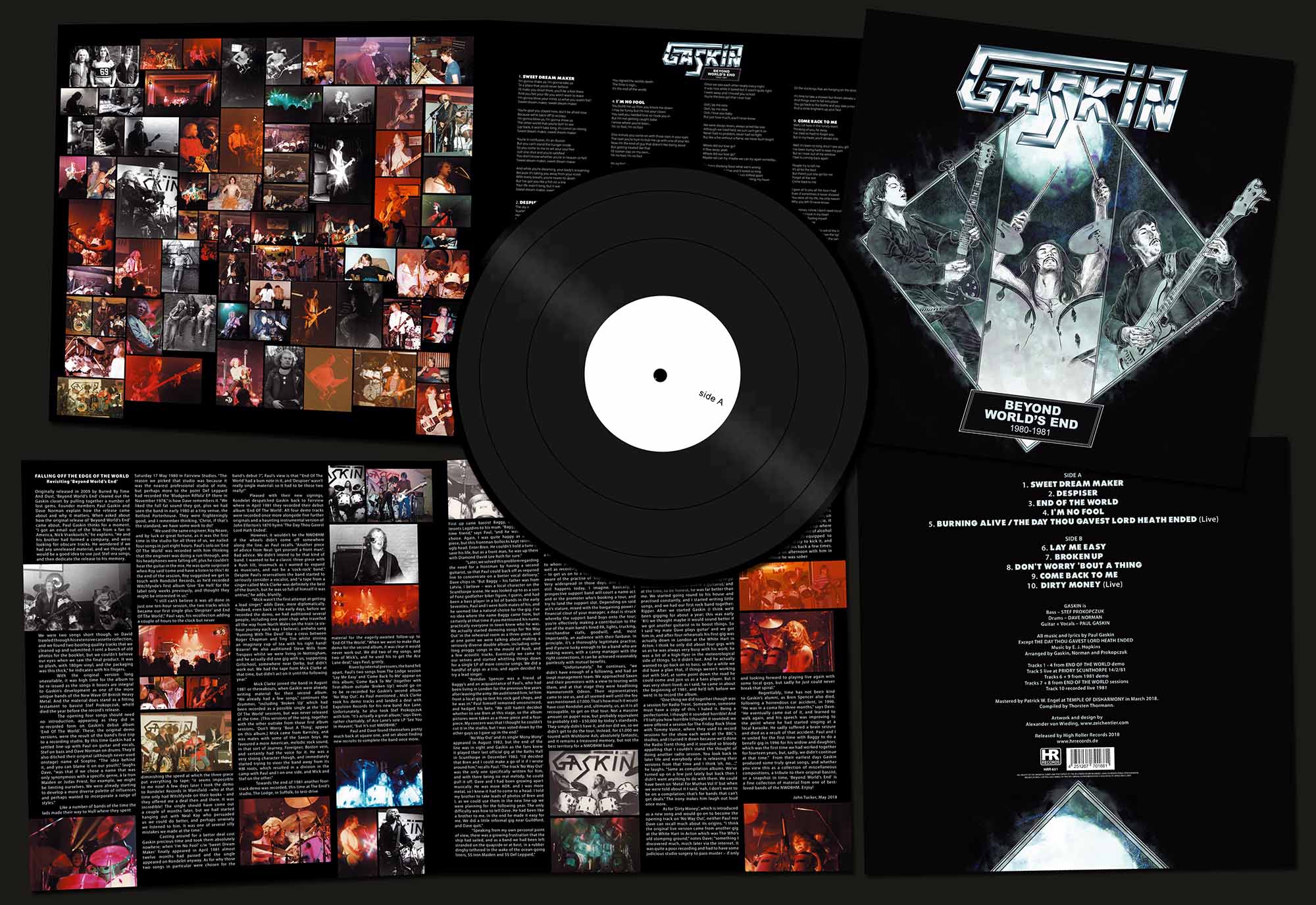 | ||||
| GASKIN - Beyond World's End LP | |
HRR 631, ltd 300, 150 x black + 150 x silver vinyl, 4 page insert | |
| Paul Gaskin - guitar + vocals Stef Prokopczuk - bass Dave Norman - drums | |
| 01 Sweet Dream Maker 02 Despiser 03 End of the World 04 I'm No Fool 05 Burning Alive + The Day Thou Gavest Lord Heath Ended (live) 06 Lay Me Easy 07 Broken Up 08 Don't Worry 'bout A Thing 09 Come Back to Me 10 Dirty Money (live) | |
AVAILABLE | |
Mastered by Patrick W. Engel at TEMPLE OF DISHARMONY in March 2018.
Coverart by Alexander "Zeichentier" von Wieding
Falling Off The Edge Of The World – Revisiting ‘Beyond World’s End’
Originally released in 2009 by Buried By Time And Dust, ‘Beyond World’s End’ cleared out the Gaskin closet by pulling together a number of lost gems. Founder members Paul Gaskin and Dave Norman explain how the release came about and why it matters.
When asked about how the original release of ‘Beyond World’s End’ came about, Paul Gaskin thinks for a moment. “I got an email out of the blue from a fan in America, Nick Vrankovitch,” he explains. “He and his brother had formed a company, and were looking for obscure tracks. He wondered if we had any unreleased material, and we thought it would be a good idea to use just Stef-era songs, and then dedicate the release to his memory. We were two songs short though, so David trawled through his extensive cassette collection, and we found two bootleg quality tracks that we cleaned up and submitted. I sent a bunch of old photos for the booklet, but we couldn’t believe our eyes when we saw the final product. It was so plush, with 180gm vinyl, and the packaging was this thick,” he indicates with his fingers.
With the original version long unavailable, it was high time for the album to be re-issued as the songs it boasts are integral to Gaskin’s development as one of the more unique bands of the New Wave Of British Heavy Metal. And the material does stand as a fitting testament to bassist Stef Prokopczuk, who’d died the year before the record’s release.
The opening four songs should need no introduction, appearing as they did in re-recorded form on Gaskin’s debut album ‘End Of The World’. These, the original demo versions, were the result of the band’s first trip to a recording studio. By this time Gaskin had a settled line-up with Paul on guitar and vocals, Stef on bass and Dave Norman on drums. They’d also ditched their original (although never used onstage) name of Sceptre. “The idea behind it, and you can blame it on our youth!,” laughs Dave, “was that if we chose a name that was only synonymous with a specific genre, à la Iron Maiden or Judas Priest, for example, we might be limiting ourselves. We were already starting to develop a more diverse palette of influences and perhaps wanted to incorporate a range of styles.”
Like a number of bands of the time the lads made their way to Hull where they spent Saturday 17 May 1980 in Fairview Studios. “The reason we picked that studio was because it was the nearest professional studio of note, but perhaps more to the point Def Leppard had recorded the ‘Bludgeon Riffola’ EP there in November 1978,” is how Dave remembers it. “We liked the full fat sound they got, plus we had seen the band in early 1980 at a tiny venue, the Retford Porterhouse. They were frighteningly good, and I remember thinking, ‘Christ, if that’s the standard, we have some work to do!’
“We used the same engineer, Roy Neave, and by luck or great fortune, as it was the first time in the studio for all three of us, we nailed four songs in just eight hours. Paul’s solo on ‘End Of The World’ was recorded with him thinking that the engineer was doing a run through, and his headphones were falling off, plus he couldn’t hear the guitar in the mix. He was quite surprised when Roy said ‘come and have a listen to this’! At the end of the session, Roy suggested we get in touch with Rondolet Records, as he’d recorded Witchfynde’s first album ‘Give ’Em Hell’ for the label only weeks previously, and thought they might be interested in us.”
“I still can’t believe it was all done in just one ten-hour session, the two tracks which became our first single plus ‘Despiser’ and ‘End Of The World’,” Paul says, his recollection adding a couple of hours to the clock but never diminishing the speed at which the three-piece put everything to tape; “it seems impossible to me now! A few days later I took the demo to Rondelet Records in Mansfield –who at that time only had Witchfynde on their books – and they offered me a deal then and there. It was incredible! The single should have come out a couple of months later, but we had started hanging out with Neal Kay who persuaded us we could do better, and perhaps unwisely we listened to him. It was one of several silly mistakes we made at the time.”
Casting around for a better deal cost Gaskin precious time and took them absolutely nowhere; when ‘I’m No Fool’ c/w ‘Sweet Dream Maker’ finally appeared in April 1981 almost twelve months had passed and the single appeared on Rondelet anyway. As for why those two songs in particular were chosen for the band’s debut 7”, Paul’s view is that “‘End Of The World’ had a bum note in it, and ‘Despiser’ wasn’t really single material: so it had to be those two really!”
Pleased with their new signings, Rondelet despatched Gaskin back to Fairview where in April 1981 they recorded their debut album ‘End Of The World’. All four demo tracks were recorded once more alongside five further originals and a haunting instrumental version of John Ellerton’s 1870 hymn ‘The Day Thou Gavest Lord Hath Ended’.
However, it wouldn’t be the NWOBHM if the wheels didn’t come off somewhere along the line, as Paul recalls. “Another piece of advice from Neal: ‘get yourself a front man!’. Bad advice. We didn’t intend to be that kind of band. I wanted to be a classic three-piece with a Rush tilt, insomuch as I wanted to expand as musicians, and not be a ‘cock-rock’ band.” Despite Paul’s reservations the band started to seriously consider a vocalist, and “a tape from a singer called Mick Clarke was definitely the best of the bunch, but he was so full of himself it was untrue,” he adds, bluntly.
“Mick wasn’t the first attempt at getting a lead singer,” adds Dave, more diplomatically. “Indeed, even back in the early days, before we recorded the demo, we had auditioned several people, including one poor chap who travelled all the way from North Wales on the train (a six-hour journey each way I believe), andwho sang ‘Running With The Devil’ like a cross between Roger Chapman and Tiny Tim whilst stirring an imaginary cup of tea with his right hand! Bizarre! We also auditioned Steve Mills from Trespass whilst we were living in Nottingham, and he actually did one gig with us, supporting Girlschool, somewhere near Derby, but didn’t work out. We had the tape from Mick Clarke at that time, but didn’t act on it until the following year.”
Mick Clarke joined the band in August 1981 or thereabouts, when Gaskin were already writing material for their second album. “We already had a few songs,” continues the drummer, “including ‘Broken Up’ which had been recorded as a possible single at the ‘End Of The World’ sessions, but was never released at the time. [This versions of the song, together with the other outtake from those first album sessions, ‘Don’t Worry ’Bout A Thing’, appear on this album."> Mick came from Barnsley, and was mates with some of the Saxon boys. He favoured a more American, melodic rock sound, in that sort of Journey, Foreigner, Boston vein, and certainly had the voice for it. He was a very strong character though, and immediately started trying to steer the band away from its HM roots, which resulted in a division in the camp with Paul and I on one side, and Mick and Stef on the other.”
Towards the end of 1981 another four-track demo was recorded, this time at The Enid’s studio, The Lodge, in Suffolk, to test-drive material for the eagerly-awaited follow-up to ‘End Of The World’. “When we went to make that demo for the second album, it was clear it would never work out. We did two of my songs, and two of Mick’s, and he used his to get the Ace Lane deal,” says Paul, grimly.
Riven by internal pressures, the band fell apart. Paul’s two songs from The Lodge session ‘Lay Me Easy’ and ‘Come Back To Me’ appear on this album; ‘Come Back To Me’ (together with first-album outtake ‘Broken Up’) would go on to be re-recorded for Gaskin’s second album ‘No Way Out’. As Paul mentioned , Mick Clarke took his demo tracks and landed a deal with Expulsion Records for his new band Ace Lane. Unfortunately, he also took Stef Prokopczuk with him. “It’s actually a great album,” says Dave, rather charitably, of Ace Lane’s sole LP ‘See You In Heaven’, “but it’s not NWOBHM.”
Paul and Dave found themselves pretty much back at square one, and set about finding new recruits to complete the band once more. First up came bassist Baggy, or Mark Carlos Imonts Lagzdins to his mum. “Baggy was a long-time friend,” says Paul, “and he was a natural choice. Again, I was quite happy as a three-piece, but this frontman bollocks kept raising its ugly head. Enter Bren. He couldn’t hold a tune to save his life, but as a front man, he was up there with Diamond David Lee Roth for sure.”
“Later, we solved this problem regarding the need for a frontman by having a second guitarist, so that Paul could back off as required live to concentrate on a better vocal delivery,” Dave chips in. “But Baggy – his father was from Latvia, I believe – was a local character on the Scunthorpe scene. He was looked up to as a sort of Fonz godfather biker figure, I guess, and had been a bass player in a lot of bands in the early Seventies. Paul and I were both mates of his, and he seemed like a natural choice for the gig. I’ve no idea where the name Baggy came from, but certainly at that time if you mentioned his name, practically everyone in town knew who he was. We actually started demoing songs for ‘No Way Out’ in the rehearsal room as a three-piece, and at one point we were talking about making a seriously diverse double album, including some long proggy songs in the mould of Rush, and a few acoustic tracks. Eventually we came to our senses and started whittling things down for a single LP of more concise songs. We did a handful of gigs as a trio, and again decided to try a lead singer.
“Brendan Spencer was a friend of Baggy’s and an acquaintance of Paul’s, who had been living in London for the previous few years after leaving the army. We auditioned him, let him front a local gig to test his rock god chops, and he was in.”
Paul himself remained unconvinced, and hedged his bets. “We still hadn’t decided whether to use Bren at this stage, so the album pictures were taken as a three-piece and a four-piece. My concern was that I thought he couldn’t cut it in the studio, but I was voted down by the other guys so I gave up in the end.”
‘No Way Out’ and its single ‘Mony Mony’ appeared in August 1982, but the end of the line was in sight and Gaskin as the fans knew it played their last official gig at the Baths Hall in Scunthorpe in December 1982. “I’d decided that Bren and I could make a go of it if I wrote around him,” recalls Paul. “The track ‘No Way Out’ was the only one specifically written for him, and with there being no real melody, he could pull it off. Dave and I had been growing apart musically. He was more AOR, and I was more metal, so I knew it had to come to a head. I told my brother to take loads of photos of Bren and I, as we could use them in the new line-up we were planning for the following year. The only difficulty was how to tell Dave. He had been like a brother to me. In the end he made it easy for me. We did a little informal gig near Guildford, and Dave quit.”
“Speaking from my own personal point of view, there was a growing frustration that the ship had sailed, and as a band we had been left stranded on the quayside or at best, in a rubber dinghy tethered in the wake of the ocean-going liners, SS Iron Maiden and SS Def Leppard,” Dave laments. “Our record label was just too small financially to be able to open the doors that needed to open for us to jump up to the next level. I honestly believe the band had enormous potential, and could play on a world stage; we just lacked the clout and push to get us in front of the big movers and shakers. No different from a thousand other bands, I guess.
“We had been badgering Rondolet – to whom we had signed for management, as well as recording and publishing: big mistake! – to get us on to a tour. I’m not sure if you’re aware of the practise of ‘buying on’ to a tour? Very widespread in those days, and probably still happens today, I imagine. Basically, a prospective support band will court a name act and or the promoter who’s booking a tour, and try to land the support slot. Depending on said act’s stature, mixed with the bargaining power / financial clout of your manager, a deal is struck whereby the support band buys onto the tour; you’re effectively making a contribution to the use of the main band’s hired PA, lights, trucking, merchandise stalls, goodwill, and, most importantly, an audience with their fanbase. In principle, it’s a thoroughly legitimate practise, and if you’re lucky enough to be a band who are making waves, with a canny manager with the right connections, it can be achieved reasonably painlessly with mutual benefits.
“Unfortunately,” he continues, “we didn’t have enough of a following, and had an inept management team. We approached Saxon and their promoters with a view to touring with them, and at that stage they were headlining Hammersmith Odeon. Their representatives came to see us, and all seemed well until the fee was mentioned: £7,000. That’s how much it would have cost Rondolet and, ultimately, us, as it is all recoupable, to get on that tour. Not a massive amount on paper now, but probably equivalent to probably £40 – £50,000 by today’s standards. They simply didn’t have it, and nor did we, so we didn’t get to do the tour. Instead, for £1,000 we toured with Wishbone Ash; absolutely fantastic, and it remains a treasured memory, but not the best territory for a NWOBHM band. After the tour ended, I became disillusioned with both the music scene and the band’s direction, and wanted to leave. We did one more gig in Chiddingfold, Surrey, and I left.”
‘Beyond World’s End’ is completed by two cuts which showcase the band in its natural environment – live on stage. ‘Burning Alive’ is taken from a gig on St Valentine’s Day 1981 at Gaskin’s spiritual home, The Priory, in Scunthorpe. A lively and raucous rendition of the song – filled out with the addition of ‘The Day Thou Gavest Lord Hath Ended’ – this version is of additional interest to fans as it features second guitarist Dave Screen. “Dave is the reason I got serious,” recalls Paul. “Dave and I have known each other since I was about 16. His father used to be the head doctor of Rampton Hospital, incidentally, and I remember they lived in this really big house.
“However,” he continues, returning to the point in hand, “he came round to my house one day – I’d just started playing guitar – and said ‘I want to start a band; I’ve got a friend who’s a drummer, and I play guitar but I’m going to go onto bass because I hear you’re a guitarist,’ and at the time, to be honest, he was far better than me. We started going round to his house and practised constantly, and I started writing little songs, and we had our first rock band together: Ripper. After we started Gaskin (I think we’d been gigging for about a year; this was early ’81) we thought maybe it would sound better if we got another guitarist in to boost things. So I said ‘my mate Dave plays guitar’ and we got him in, and after four rehearsals his first gig was actually down in London at the White Hart in Acton. I think he only did about four gigs with us as he was always very busy with his work; he was a bit of a high-flyer in the meteorological side of things. So it didn’t last. And he actually wanted to go back on to bass, so for a while we did have a plan that, if things weren’t working out with Stef, at some point down the road he could come and join us as a bass player. But it was very short-lived; as I said, he came in about the beginning of 1981, and he’d left before we went in to record the album.
“One thing we did together though was a session for Radio Trent. Somewhere, someone must have a copy of this. I hated it. Being a perfectionist, I thought it sounded horrible! And I’ll tell you how horrible I thought it sounded: we were offered a session for The Friday Rock Show with Tommy Vance, where they used to record sessions for the show each week at the BBC’s studios, and I turned it down because we’d done the Radio Trent thing and it sounded so bloody appalling that I couldn’t stand the thought of doing another radio session. You look back in later life and everybody else is releasing their versions from that time and I think ‘oh, no…’,” he laughs. “Same as compilation albums. We’ve turned up on a few just lately but back then I didn’t want anything to do with them. We could have been on ‘Metal For Muthas Vol II’ but when we were told about it I said, ‘nah, I don’t want to be on a compilation; that’s for bands that can’t get deals.” The irony makes him laugh out loud once more.
As for ‘Dirty Money’, which is introduced as a new song and would go on to become the opening track on ‘No Way Out’, neither Paul nor Dave can recall much about its origins. “I think the original live version came from another gig at the White Hart in Acton which was The Who's old stomping ground,” notes Dave; “something I discovered much, much later via the internet. It was quite a poor recording and had to have some judicious studio surgery to pass muster – if only we'd had the budget and the equipment back in the day. It was probably late 1981 or perhaps very early 1982; before Stef left, anyway.”
As mentioned previously, ‘Beyond World’s End’ was always seen as a tribute to Stef Prokopczuk, and all the songs on it link back to him. The band’s original bassist died on 17 January 2008 from an undiagnosed congenital heart condition. “We were all very shocked, as he was very fit, didn’t have any ‘excess’ vices, and had no previous symptoms,” explains Dave. His successor Baggy passed away four years later, on 19 July 2012. “For any of us in Baggy's circle, it wasn't really a surprise that he ended up where he was,” Dave remembers, “as a lifetime of alcohol abuse unfortunately left him ill-equipped to fight off any illnesses. He did try to kick it, and almost got the monkey off his back a few times. I remember spending an afternoon with him in the early 2000s where he was sober and looking forward to playing live again with some local guys, but sadly he just could never break that spiral.”
Regrettably, time has not been kind to Gaskin’s alumni, as Bren Spencer also died, following a horrendous car accident, in 1996. “He was in a coma for three months,” says Dave. “He eventually came out of it, and learned to walk again, and his speech was improving to the point where he had started singing at a local karaoke. He sadly suffered a brain seizure and died as a result of that accident. Paul and I re-united for the first time with Baggy to do a benefit gig in 1996 for his widow and daughter, which was the first time we had worked together for fourteen years, but, sadly, we didn’t continue at that time.”
From their earliest days Gaskin produced some truly great songs, and whether you view this as a collection of miscellaneous compositions, a tribute to their original bassist, or a snapshot in time, ‘Beyond World’s End’ is a fine collection of material from one of best-loved bands of the NWOBHM. Enjoy!
John Tucker May 2018


